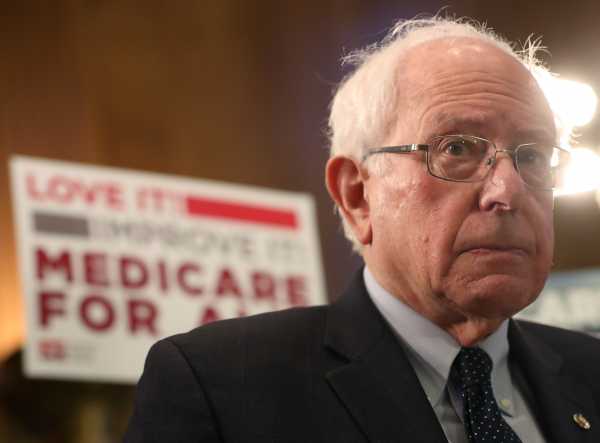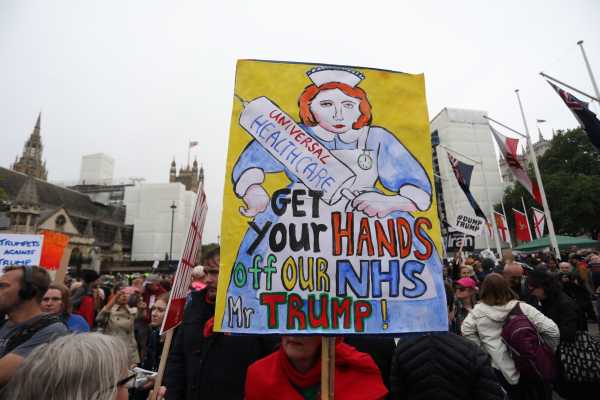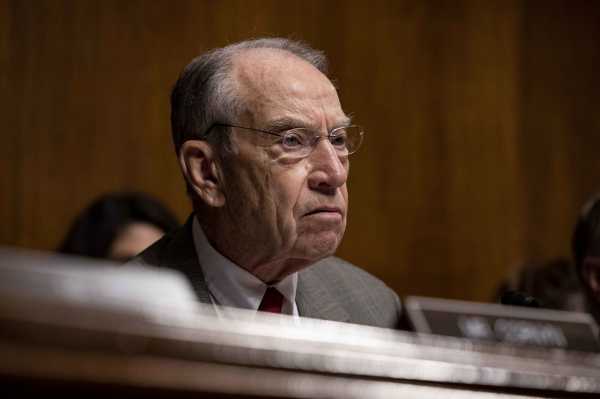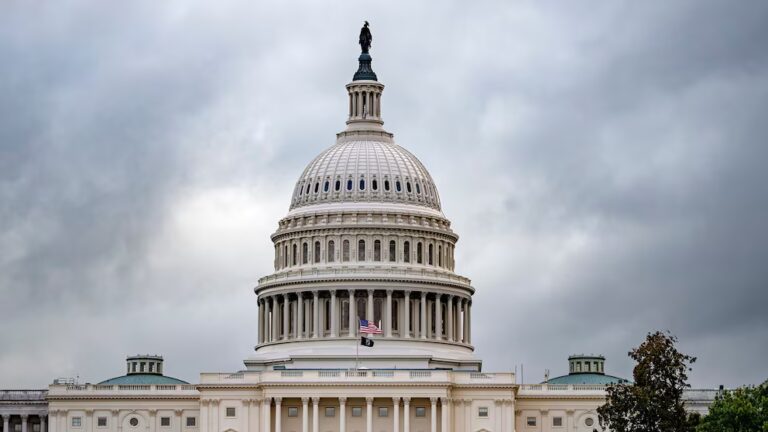
“Who here would abolish their private health insurance in favor of a government-run plan?” asked moderator Lester Holt at the first Democratic debate. “Just a show of hands to start off with.”
He asked the same question again the next night. “Many people watching at home have health insurance through their employer,” he said. “Who here would abolish their private health insurance in favor of a government-run plan?”
There were two problems with this question. The first — which led to some confusion on Sen. Kamala Harris’s part — is that it’s unclear: Was Holt asking about the candidates’ own health care plans, or their plans for the country?
The second, bigger problem is that it’s a ridiculous question. There is exactly one reasonable response to whether you would abolish private insurance, and it isn’t “yes” or “no.” It’s not raising or lowering your hand. It’s: “It depends.” There are a bunch of questions that need to be answered first before you can even make sense of it.
Virtually all of the Democrats’ health coverage goals can be achieved with or without private insurance. The harder questions — the ones that will define any plan they ultimately want to pass — are about what’s covered, how costs are controlled, and how the plan is financed. How you answer those questions decides how you should answer the private insurance question.
Holt’s question, like the rest of the Democrats’ health care debate, is framed by Bernie Sanders’s Medicare-for-all plan. Abolishing private insurance is the most controversial, unpopular stand Sanders’s plan takes, which has made it catnip for reporters looking to spark a fight among the Democrats. But Sanders’s proposal makes some unlikely promises and has critical omissions, and until you work through those, arguing about private insurance is a red herring.

Sanders’s plan, for instance, proposes covering health expenses of all kinds without copays or deductibles. That’s more generous than Medicare is now, and it’s more generous than the health coverage offered in any other country. The reason no one offers coverage that generous is that doing so would carry an incredible price tag, particularly in the United States, where health care is costlier. We don’t know the projected cost of the Sanders plan — the Congressional Budget Office hasn’t scored it — but it would be in the tens of trillions of dollars, and Sanders hasn’t said how he’ll pay for it.
But if you assume both the generosity and the financing of Sanders’s plan, there’s really no reason to debate private insurance. If the government will cover everything, with no copays or deductibles or hidden forms of rationing, then there’s no need for private coverage. What would it even be covering? It’s only if you can’t finance a plan that generous, and therefore need more cost sharing, or tighter benefit packages, or a global budget that forces the government to ration access to costly drugs or services, that private insurance becomes more important.
This is evident in the text of Sanders’s bill, which doesn’t actually abolish private insurance. It outlaws “health insurance coverage that duplicates the benefits provided under this Act.” If the proposed benefits contracted during the legislative process, it would open more room for private insurers to enter the system. So even Sanders’s answer to this question isn’t truly “yes” or “no.” It depends on what’s covered, which in turn depends on how much Americans are willing to pay in taxes. (I should note here that Section 601 of Sanders’s plan includes a provision for a global budget, which could be a powerful cost control tool, but it doesn’t say anything about what the budget would be or how it would be decided.)
However, I come not just to bury the “would you abolish private insurance” question. Taking a page from David Roberts’s excellent rundown of questions that should be asked at a climate debate, here are some more illuminating health care questions that the Democratic candidates should be asked:
1) What will you do about the filibuster?
I know. I’m a broken record on this one. But if Democrats don’t have a plan for the filibuster, they don’t have a plan for ambitious health care reform, and they shouldn’t be allowed to pretend they do.
A bare majority in the Senate will be hard even if Democrats pull a good hand in 2020. But there’s no path to a 60-vote Democratic supermajority. That means that Democrats either need to get rid of the filibuster, which they can do with 51 votes, or they need to repeatedly overrule parliamentary challenges to their reconciliation bill, which is pretty much the same thing. (Sanders, for his part, is banking on the latter strategy.)
Either strategy will be a tough sell: Senate Democrats have rediscovered their affection for the filibuster in the Trump era; even Minority Leader Chuck Schumer says he regrets weakening the rule in 2013. How do the 2020 candidates plan to change Chuck’s mind?
2) Should government set health care prices centrally, as is true in almost every other country, or not?
This is arguably the key question in health care reform. Survey global health systems and you’ll find lots of approaches to private insurance. Switzerland’s system is built around heavily regulated private insurance with a supercharged individual mandate. France’s system combines a basic public plan with supplementary private insurance. Canada relies almost entirely on public insurance. Singapore has an odd mix of compulsory savings plans and government-run hospitals wards. But the government largely or entirely sets prices in all these systems, and it negotiates far lower prices for services and drugs than we pay in America.

Centralized price setting isn’t some peculiar international practice; we do it in America too. Medicare, Medicaid, and VA all negotiate much lower prices than private insurance. Medicare, for instance, tends to pay significantly less than private insurers for the same services. Sanders’s Medicare-for-all bill would extend those prices across the system, which is how it controls costs.
During the first debate, John Delaney took direct aim at this part of Sanders’s plan. “If you go to every hospital in this country and you ask them one question, which is how would it have been for you last year if every one of your bills were paid at the Medicare rate, every single hospital administrator [would] say they would close. And the Medicare-for-all bill requires payments to stay at current Medicare rates. So to some extent, we’re basically supporting a bill that will have every hospital close.”
I think Delaney is wrong about this. Much of the health care system could adjust to a Medicare rate, in part because the volume of health services would rise if everyone was covered and everything was free at point of service. But not all hospitals or doctors could make the adjustment — particularly in rural areas. And if health care becomes even more of a volume business than it is now, that could mean long waits, as demand would increase far faster than supply. So there are real trade-offs here, and the Democrats should debate them.
3) Why should Americans trust the government to decide what is and isn’t covered by health insurance?
Both the Medicare-for-all and Medicare-for-more plans envision the government structuring the country’s main health insurance plan. But what happens when Republicans are in charge of that plan, and they decide that abortion and Plan B contraceptive pills shouldn’t be covered? Or that there should be a work requirement for able-bodied adults who want health insurance? The Trump administration recently approved Wisconsin’s request to add a work requirement to Medicaid, for instance.
There are other concerns as well. The late, great health economist Uwe Reinhardt supported single-payer, but he once told me he thought America’s system of government was “too corrupt” to make it work. “When you go to Taiwan or Canada,” Reinhardt said, “the kind of lobbying we have here is illegal there. You can’t pay money to influence the party the same way. Therefore, the bureaucrats who run these systems are pretty much insulated from these pressures. Here you have basically a board of directors in the House Ways and Means Committee that gets money from lobbyists both at the regulatory writing stage and during normal operations.”

If the government runs the country’s main health insurer, the entirety of the health care industry’s might will be turned on lobbying the federal government. And the health care industry is mighty. It’s not just rich — it’s also spread out, between hospitals and doctors and nurses and drug and device manufacturers, across every congressional district. How do you stop the system from collapsing into corruption?
4) Why should, or shouldn’t, you have cost sharing at the point of service?
The role of cost sharing is a tough issue in health policy. The bills need to get paid no matter what. The question is when they’re paid, and by whom. The case for financing all care through taxes or premiums is that people shouldn’t have to worry about money when they’re in the doctor’s office. The case for adding copays, deductibles, and other forms of point-of-service payment is that they should.
The evidence on this is clear in both directions. First, cost sharing really does lead people to use less health care overall. Second, people don’t know which health care to prioritize and which to skip, so this is not a medically efficient way of helping people make choices.
A treasured theory in health care, though, is that it could be. When the Affordable Care Act passed, there was a lot of hype about comparative effectiveness research. The idea was that you’d fund research into which treatments were the most cost-effective and then insurers, be they public or private, could nudge people toward the highest-value treatments, potentially by adding more cost sharing when people chose a less effective path. The Affordable Care Act bill even created the Patient-Centered Outcomes Research Institute to fund more of this research, which has had, as far as I can tell, very little effect on the health care system.
But this is the second level of the cost-sharing debate. If the government is the only or main insurer, and all care is free at the point of service, then the main way the government can push people toward more effective treatments and providers is to refuse to cover the alternatives, which is more draconian than the evidence can usually support. (There are other things it can do on the provider side, but that’s a different debate.) On the other hand, should people really be consulting price lists in the hospital?
5) Keeping America out of it, which country has the best health care system in the world?
This would be my pick for a question that every candidate has to answer. Their replies would be revealing in terms of their hoped-for health care utopia, but also in terms of their health policy knowledge.
Canada and the UK dominate the American discussions for reasons of both proximity and language. But that distorts our health care conversation in odd ways. Both countries have unusually government-centric health systems — Canada is pretty close to true single-payer, while the UK is nearer to socialized medicine — and they have particular drawbacks, namely that they tend to have longer waiting times for care. A lot of health experts prefer the German, French, Singaporean, and Australian systems, but they get less coverage.
6) What would you do to improve American health outcomes beyond health insurance?
Public health experts estimate that health care only accounts for about 10 percent of health outcomes. The other 90 percent is split between individual behavior (40 percent), genetics (30 percent), and social and environmental factors (20 percent). So most of what makes us healthy or ill doesn’t happen in a hospital or doctor’s office and isn’t covered by insurance.

Another way of thinking about this is simpler, but grimmer: Since the Affordable Care Act’s passage, more Americans than ever are covered by health insurance. But American life expectancy has been falling. The drivers here are suicide and drug overdoses, the so-called “deaths of despair.” Looked at another way, it’s inequality — the rich are still seeing longevity gains, while the poor are watching their life expectancy fall. None of this will be fixed by rejiggering insurance coverage.
Mortality data gets the headlines here, but there’s much more worth thinking about. There’s the built environment. There’s how we tax, or don’t tax, alcohol, cigarettes, and sugar. There’s treatment for drug addiction and lead abatement in poor communities. There’s the food we do or don’t subsidize, the safety of communities, the particulates in the air children breathe.
Health insurance is fundamentally about how we pay for medical treatment. That’s an important part of our lives and our health, but not a dominant part. What a candidate would do about health insurance should be one plank of a broader agenda for health.
7) What would you do to accelerate medical innovation?
In 2003, President George W. Bush passed the Medicare Prescription Drug Benefit, better known as Medicare Part D. The plan added prescription drug coverage to Medicare, but it handed the system over to private insurers and barred the government from negotiating down prices as it does elsewhere in the program.
A decade later, conservatives bragged that Medicare Part D came in under budget. But the savings came, in large part, from an alarming source: “a decline in the number of new drug products that are expected to reach the market,” according to Medicare’s trustees.
The slowdown in pharmaceutical innovation is widely acknowledged, well-documented, and deeply troubling. Most Americans have health insurance. Most Americans are able to get care if they need it. What matters at the point of crisis, then, isn’t just whether someone is covered, but what that coverage can buy. The best insurance in the world won’t save us if our antibiotics fall behind drug-resistant bacteria.
This is particularly pressing for Democrats because the best argument against centralized price setting is that it will slow innovation. So what plans do Democrats have to boost innovation in the health care space? Sanders, for his part, has an interesting idea to use prizes to generate new pathways for pharmaceutical development, but he’s one of the only Democrats with any kind of plan along these lines, and he doesn’t talk about it often. It would be good for all of them to give this more thought.
Sourse: vox.com






